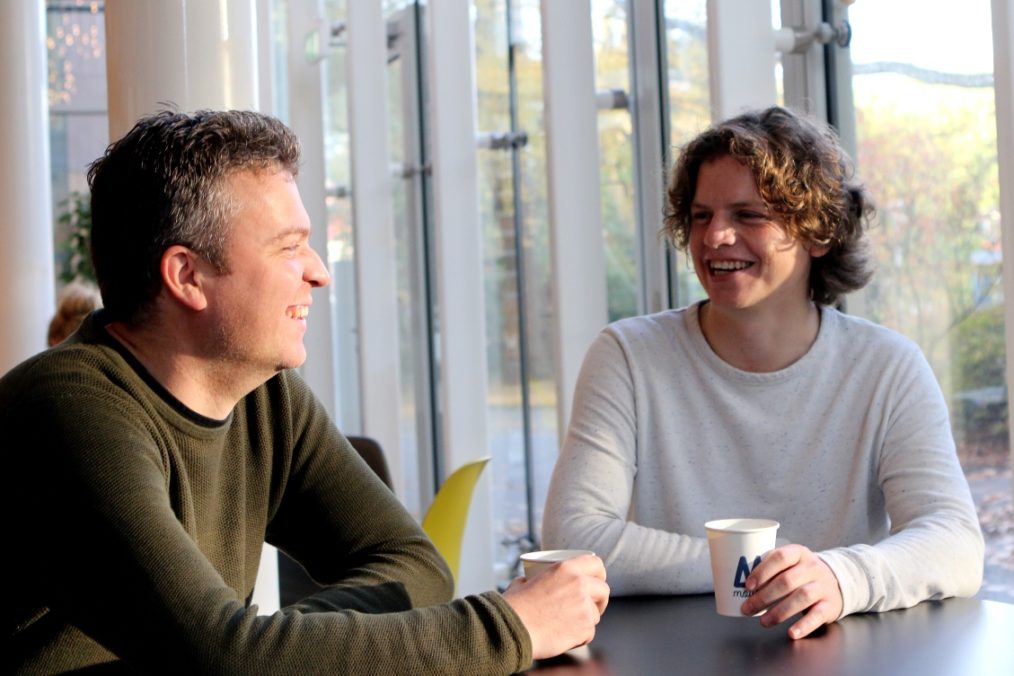
Duo interview: Our recent Veni grantees
Who has not heard of Veni-Vidi-Vici? In funding land, these are three types of grants awarded to outstanding junior, intermediate, and senior researchers, respectively. This year, the Netherlands Science Foundation NWO included Dr. Maarten Eisma (Clinical Psychology) [1] and Dr. Bertus Jeronimus (Developmental Psychology) [2] among its Veni grantees. This means they each receive 250,000 euros for a research project that was rated excellent by an international expert review committee.
You can read about Dr. Eisma’s and Dr. Jeronimus’ Veni projects on the university website (there were 12 Groningen grantees this year) and on our faculty website (5 out of 12 grantees were affiliated with Behavioural and Social Sciences). In light of this exciting development in their research careers, Mindwise decided to ask Drs. Eisma and Jeronimus about their grant writing experiences.
MINDWISE: What part of the Veni application procedure did you enjoy the most, and why?
Dr. Eisma: Writing the Veni proposal forced me to develop my ideas about approach and avoidance processes in prolonged grief disorder. I liked discussing my ideas with colleagues, family, and friends. I discovered that telling a story multiple times eventually makes one get to the core of what is most important, and tell the story in a way that sells the theory and proposed studies even to people who are no experts in the field.
But to be fair, the most enjoyable thing was getting the news that the grant was awarded and the two weeks that followed it, in which I got congratulated on a daily basis. The Veni application procedure is time-consuming and stressful, and the odds are quite high that you will be unsuccessful. So when you get the award, this is a great relief!
“telling a story multiple times eventually makes one get to the core of what is most important”
Dr. Jeronimus: I liked the group meetings and training with the other Veni applicants the most. All these enthusiastic young researchers working on a broad diversity of ideas stimulated each another to get the best out of themselves and their proposals. Beautiful. This writing group stimulated me to cut most of my ideas out of the proposal, which could make me feel sad temporarily, but proved to be a brilliant strategy.
What is great about writing a grant proposal is that it forces you to focus on (a) what you like most about research, (b) what you want to do with the next 3-4 years of your life, and (c) whether you want to have a societal impact. I was keenly aware that my current job was not bad – it is highly diverse and provides me with a lot of freedom – and in order to be happy with a Veni grant, it should not make my life worse. As everything you promise in the proposal will result in months of work, this was my guiding directive during the writing process.
“I now feel more competent”
I also learned to craft an extremely short but high-impact presentation for the Veni committee, a group of researchers with diverse backgrounds. It made me feel good that this presentation went according to plan – whether I would get the grant or not, I did the best I could. That felt good.
MINDWISE: If you could apply again, what would you do differently?
Dr. Jeronimus: As I now feel more competent I would immediately start formulating a research proposal that made me happy 🙂 I would go to Gert Stulp early in the process and ask him to think with me on how to graphically present my idea, which helped me pass the Veni presentation and interview. And I would plan two weeks off after completing the proposal.
Dr. Eisma: The short answer is that I got the grant, so I would not do anything differently. The long answer: When I started writing my Veni proposal, I was borrowing ideas from others. At some point someone asked me quite plainly: What do you think is the most interesting to study? The answer to this question turned out to be very different from the proposal I had been writing so far, and inspired the content of my final proposal.
“plan two weeks off after completing the proposal”
If you have been doing research in a particular field for several years, you are likely to have developed some theories that you think are crucial to test. I would advise anyone who aspires to get a Veni grant to go with their gut feeling when choosing a proposal topic. If you think your project is worthwhile, then you will be much better at convincing others that the project should be funded.
Dr. Eisma asks Dr. Jeronimus: A colleague of mine used to say that ‘research is me-search’. Your proposal was about ‘happy neurotics’. Are you a happy neurotic? And do you think that academia provides a good environment for happy neurotics?
Dr. Jeronimus: I agree, research is often me-search. Generally I’m a happy person. However, I score very low on neuroticism and I experience relatively few negative emotions. I studied neuroticism for the past 9 years and it remains exciting to study why some people have a higher propensity to experience anxiety, sadness, worry, frustration, self-consciousness, and threat, than others. Perhaps this is because these experiences do not come naturally to me, although, paradoxically, this makes it me-search too.
“If you think your project is worthwhile, then you will be much better at convincing others that the project should be funded.”
I think academia can be a good environment for happy neurotics, as highly neurotic people tend to be critical of themselves and their performances, which can propel self-improvement and reaching difficult goals. Also, they typically put in more effort, which may pay off in academia. However, I do not believe this alone is likely to make them any happier, and they may become workaholics. Moreover, while a good project team may need a highly neurotic team member because they sober group decision making and prevent group-think, it also needs optimistic and happy people to get a project rolling. Perhaps happy neurotics are the ideal mix.
Dr. Jeronimus asks Dr. Eisma: How did your fascination with prolonged grief disorder came into being? Do you believe the Dutch would benefit from re-introducing historical mourning rituals, such as wearing dark clothing for weeks and cutting our hair?
Dr. Eisma: I did not experience bereavement at a very young age. However, both my parents lost their fathers and my father also lost his sister when they were in their teens. These events have been very influential in their lives. Their story inspired some fascination with this topic in me. Nevertheless, it certainly wasn’t a life-long goal to be a grief and bereavement researcher. I rolled into the topic more or less by accident. I was looking for a PhD position in clinical psychology. A PhD project on rumination following bereavement was available when I was searching, it appealed to me, so I applied. The more time I spent reading about this topic, and meeting and talking to bereaved people and grief researchers and clinicians, the more the topic captivated me.
“I rolled into the topic more or less by accident.”
Bereavement is one of the most frequently occurring major negative life-events, yet reactions to the death of a loved one vary tremendously. A minority of bereaved people develops persistent and severe grief responses that can disrupt one’s life, which is called prolonged grief. Grief and bereavement is a very small research field, and prolonged grief disorder has only this year been recognized as a diagnosis by the World Health Organization. So, it is a really exciting time to be in this field. There are lots of opportunities to make valuable contributions to our understanding of prolonged grief by doing good basic research and my Veni project will hopefully allow me to do much more than that.
Rituals increase public recognition of one’s loss and grieving process, which could be helpful. Nevertheless, I don’t really think that reintroducing past rituals would do much good. I think they mostly worked because they were widely accepted and deeply ingrained in society and in particular social groups. Reintroducing historical rituals now would be difficult and artificial. In today’s individualized society, I see more value in people developing their own ways to honor their loved ones. For instance, I once met a women whose son was a musician. After her son died, she honored him by setting up a festival in his name together with her son’s friends. If everyone could find their own (small or big) ways to honor their deceased loved ones, I think this would be valuable.
“it is a really exciting time to be in this field”
MINDWISE: Thanks to the Veni grant, you’ll both be working many more hours on your favorite topics in the next few years. Now that NWO officially sees you as an innovative researcher with high potential, what advice do you have for students aiming for a career in academia?
Dr. Eisma: If you aspire to an academic career, a first step would be to find out if it really is something for you. As an academic, you need to be able to do and like many things, such as writing, presenting, gathering and analyzing data, critical thinking, teaching, and project management. I would recommend that you try out some of these things during your studies to see if you like doing them as much as you think you would. For instance, you could try to become a teaching assistant, do a research master, or work for the university paper. Should you like doing these things, and you think you may be able to develop a near-obsessive fascination for certain topics in your field, then you should consider applying for a PhD position. Usually, completing a PhD will take you 4 to 5 years and will provide you with plenty of opportunities to find out what working in academia is all about and whether you wish to continue your career as a researcher.
Dr. Jeronimus: Follow your inner curiosity, have a nice day, be optimistic, and find yourself a mentor.



